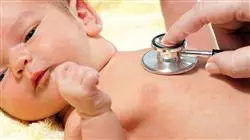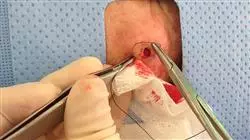University certificate
The world's largest faculty of medicine”
Introduction to the Program
This program provides you with the most recent knowledge in pediatrics in the emergency care of children and adolescents with trauma or poisoning. This way you will perform a much safer and effective professional practice"

Recent advances and scientific research in the field of pediatric care have led to a decrease in the prevalence of serious and even fatal diseases in the pediatric population. This has led primary pediatric care to focus its efforts on new focuses more closely related to pathologies such as allergies, neurodevelopmental and learning disorders or infectious diseases whose diagnosis is sometimes difficult to pinpoint. For this reason, it is vital for the professional in this field to keep abreast of the latest advances in the sector, as this is the only way to offer complete care adapted to the patient.
This Professional master’s degree provides the medical professional with an in-depth study of the latest scientific studies that address the care of the newborn, as well as the different pathologies that may arise from birth through childhood and adolescence. Through an enriched multimedia content, the pediatrician will be able to delve into the therapeutic plans for dermatological problems, the main disorders related to feeding, gastrointestinal disorders or bronchiolitis.
The teaching team that integrates this program will also provide clinical case studies that will be very useful to students, since they will bring them closer to real situations that they could encounter in their usual clinical practice. A set of innovative teaching materials that will be key for the professionals to obtain the up-to-date knowledge they are looking for.
Therefore, TECH also offers an excellent opportunity for professionals who wish to balance their professional responsibilities with a quality program. This Professional master’s degree is taught exclusively online, without fixed class schedules and with multimedia resources available 24 hours a day. Therefore, students will only need an electronic device to access the virtual platform where all the syllabus is hosted. The pediatrician is, therefore, faced with a flexible university program, offered in a format that can be taken comfortably.
This Professional master’s degree will enhance your competencies and skills through didactic resources in which the latest educational technology has been employed"
This Professional master’s degree in Pediatric Primary Care contains the most complete and up-to-date scientific program on the market. The most important features include:
- The development of case studies presented by experts in Pediatrics and Primary Care
- The graphic, schematic, and practical contents with which they are created, provide scientific and practical information on the disciplines that are essential for professional practice
- Practical exercises where self-assessment can be used to improve learning
- Its special emphasis on innovative methodologies
- Theoretical lessons, questions to the expert, debate forums on controversial topics, and individual reflection assignments
- Content that is accessible from any fixed or portable device with an Internet connection
A program that will keep you up to date with advances in allergy screening and dietary plans"
The program includes in its teaching staff professionals of the sector who pour into this training the experience of their work, in addition to recognized specialists from reference societies and prestigious universities.
The multimedia content, developed with the latest educational technology, will provide the professional with situated and contextual learning, i.e., a simulated environment that will provide immersive education programmed to learn in real situations.
This program is designed around Problem-Based Learning, whereby the professional must try to solve the different professional practice situations that arise during the course. For this purpose, the professional will be assisted by an innovative interactive video system created by renowned and experienced experts.
Access whenever you want to an up to date syllabus with the maximum scientific rigor. Thanks to this, you will be up to date in the approach to pathologies such as bronchiolitis, asthma or laryngitis"

A program that will keep you up to date with advances in allergy screening and dietary plans"
Why study at TECH?
TECH is the world’s largest online university. With an impressive catalog of more than 14,000 university programs available in 11 languages, it is positioned as a leader in employability, with a 99% job placement rate. In addition, it relies on an enormous faculty of more than 6,000 professors of the highest international renown.

Study at the world's largest online university and guarantee your professional success. The future starts at TECH”
The world’s best online university according to FORBES
The prestigious Forbes magazine, specialized in business and finance, has highlighted TECH as “the world's best online university” This is what they have recently stated in an article in their digital edition in which they echo the success story of this institution, “thanks to the academic offer it provides, the selection of its teaching staff, and an innovative learning method aimed at educating the professionals of the future”
A revolutionary study method, a cutting-edge faculty and a practical focus: the key to TECH's success.
The most complete study plans on the university scene
TECH offers the most complete study plans on the university scene, with syllabuses that cover fundamental concepts and, at the same time, the main scientific advances in their specific scientific areas. In addition, these programs are continuously being updated to guarantee students the academic vanguard and the most in-demand professional skills. In this way, the university's qualifications provide its graduates with a significant advantage to propel their careers to success.
TECH offers the most comprehensive and intensive study plans on the current university scene.
A world-class teaching staff
TECH's teaching staff is made up of more than 6,000 professors with the highest international recognition. Professors, researchers and top executives of multinational companies, including Isaiah Covington, performance coach of the Boston Celtics; Magda Romanska, principal investigator at Harvard MetaLAB; Ignacio Wistumba, chairman of the department of translational molecular pathology at MD Anderson Cancer Center; and D.W. Pine, creative director of TIME magazine, among others.
Internationally renowned experts, specialized in different branches of Health, Technology, Communication and Business, form part of the TECH faculty.
A unique learning method
TECH is the first university to use Relearning in all its programs. It is the best online learning methodology, accredited with international teaching quality certifications, provided by prestigious educational agencies. In addition, this disruptive educational model is complemented with the “Case Method”, thereby setting up a unique online teaching strategy. Innovative teaching resources are also implemented, including detailed videos, infographics and interactive summaries.
TECH combines Relearning and the Case Method in all its university programs to guarantee excellent theoretical and practical learning, studying whenever and wherever you want.
The world's largest online university
TECH is the world’s largest online university. We are the largest educational institution, with the best and widest online educational catalog, one hundred percent online and covering the vast majority of areas of knowledge. We offer a large selection of our own degrees and accredited online undergraduate and postgraduate degrees. In total, more than 14,000 university degrees, in eleven different languages, make us the largest educational largest in the world.
TECH has the world's most extensive catalog of academic and official programs, available in more than 11 languages.
Google Premier Partner
The American technology giant has awarded TECH the Google Google Premier Partner badge. This award, which is only available to 3% of the world's companies, highlights the efficient, flexible and tailored experience that this university provides to students. The recognition as a Google Premier Partner not only accredits the maximum rigor, performance and investment in TECH's digital infrastructures, but also places this university as one of the world's leading technology companies.
Google has positioned TECH in the top 3% of the world's most important technology companies by awarding it its Google Premier Partner badge.
The official online university of the NBA
TECH is the official online university of the NBA. Thanks to our agreement with the biggest league in basketball, we offer our students exclusive university programs, as well as a wide variety of educational resources focused on the business of the league and other areas of the sports industry. Each program is made up of a uniquely designed syllabus and features exceptional guest hosts: professionals with a distinguished sports background who will offer their expertise on the most relevant topics.
TECH has been selected by the NBA, the world's top basketball league, as its official online university.
The top-rated university by its students
Students have positioned TECH as the world's top-rated university on the main review websites, with a highest rating of 4.9 out of 5, obtained from more than 1,000 reviews. These results consolidate TECH as the benchmark university institution at an international level, reflecting the excellence and positive impact of its educational model.” reflecting the excellence and positive impact of its educational model.”
TECH is the world’s top-rated university by its students.
Leaders in employability
TECH has managed to become the leading university in employability. 99% of its students obtain jobs in the academic field they have studied, within one year of completing any of the university's programs. A similar number achieve immediate career enhancement. All this thanks to a study methodology that bases its effectiveness on the acquisition of practical skills, which are absolutely necessary for professional development.
99% of TECH graduates find a job within a year of completing their studies.
Professional Master's Degree in Professional Updating for the Care of the Child Primary Care Patient
Safeguarding childhood has been one of the objectives of medicine since the times when the Hebrew midwives (predecessors of the obstetrician) helped the survival of the newborn according to the writings of the Torah. Already from that time, these learned women enjoyed a remarkable status in society. Today, the figure of a specialist in child health care continues to prevail as a category of indispensable value. The Professional Master's Degree in Professional Updating for Primary Care of Children's Patients at TECH Global University is a program with an entirely online methodology, supported by the Relearning technique, which allows you to acquire a greater breadth of knowledge in an effective and dynamic way. We seek to train the physician in a wide range of highly useful skills through a select agenda of 16 modules including: newborn care, dermatology, gastroenterology, respiratory and ENT pathology, musculoskeletal system, ophthalmology, cardiology, among other topics. We will also cover in detail the different pediatric emergencies such as meningitis or anaphylaxis. Nowhere else will you find such a complete program and dispensed with the versatility offered by our distance education.
Dare to be a pediatrician firsthand
General conceptions are not enough when it comes to the health care of infants, children and adolescents. Particular theoretical foundations and specialized skills are required to determine reliable diagnoses and treatments from a parental point of view. Knowledge of neuropsychiatric concepts such as Attention Deficit Hyperactivity Disorder (ADHD) can be very useful. Likewise, knowledge about allergies or pharmacology typical of early ages is a very important tool when it comes to assessments and dosage opinions. In our Professional Master's Degree you will learn all these aspects and even more. With a staff of professors with a broad background and multidisciplinary approach, we will add to your career the most suitable skills to stand out from the work environment with results that will really surprise you. Pediatrics is one of those sectors that is becoming more and more popular and thanks to TECH you will be able to work in it in a satisfactory way. Because childhood matters and so does your vocation to safeguard it, get ready to study with the largest online university.







